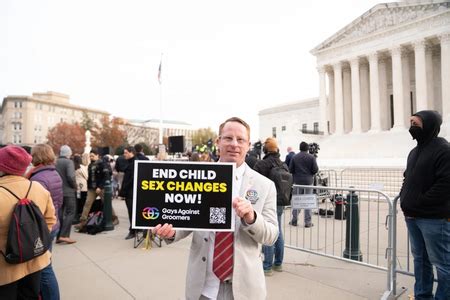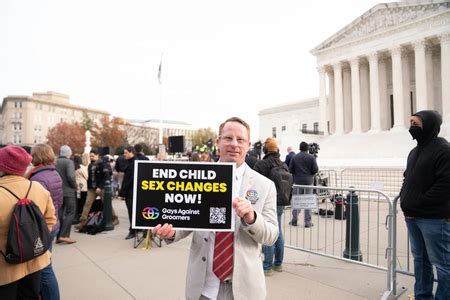
A young woman who detransitioned after undergoing gender transition as a teenager is applauding the Supreme Court’s decision to allow states to ban gender-affirming care for minors, expressing relief and hope that it will prevent others from experiencing similar regrets. Chloe Cole, who began her transition at age 13 and later detransitioned, has become a prominent voice advocating against unrestricted access to gender-affirming care for young people.
Chloe Cole, a now 19-year-old, publicly supports the Supreme Court’s decision, viewing it as a safeguard against potential harm for vulnerable adolescents. Cole began identifying as transgender at a young age, leading to medical interventions, including puberty blockers, testosterone, and a double mastectomy at 15. She later regretted these decisions and underwent detransitioning, becoming an outspoken critic of the ease with which minors can access gender-affirming treatments.
Cole’s experience is central to her advocacy. She believes that she was too young to make such life-altering decisions and that the medical professionals involved did not adequately explore underlying mental health issues or potential alternative treatments. “I went down a dark path, and I want to make sure that other kids don’t go down that same path,” Cole stated in numerous interviews and testimonies.
The Supreme Court’s decision allows states to enforce bans on gender-affirming care, including puberty blockers, hormone therapy, and surgeries for transgender minors. Several states have already enacted such bans, citing concerns about the long-term effects of these treatments and the potential for regret. Supporters of these bans argue that children are not mature enough to make informed decisions about irreversible medical procedures.
Cole’s advocacy has been particularly impactful because of her personal story. She shares her experiences through public speaking, media appearances, and legal testimonies. She has testified before state legislatures in support of bans on gender-affirming care for minors. Her arguments often center on the idea that young people should be given more time to explore their identities before undergoing medical interventions that can have permanent consequences. She contends that the current system often rushes young people into medical treatments without adequately addressing underlying mental health concerns.
The debate around gender-affirming care for minors is highly polarized. Supporters of gender-affirming care argue that these treatments are medically necessary and can significantly improve the mental health and well-being of transgender youth. They point to studies that show transgender individuals who receive gender-affirming care have lower rates of depression and suicide. They also argue that denying access to these treatments can be harmful and discriminatory.
Critics, like Cole, argue that the long-term effects of gender-affirming care are not fully understood and that more research is needed. They also raise concerns about the potential for regret and the possibility that some young people may later identify as cisgender. They emphasize the importance of comprehensive mental health evaluations and exploring alternative treatments before considering medical interventions.
The legal landscape surrounding gender-affirming care is constantly evolving. The Supreme Court’s decision has significant implications for the future of transgender rights in the United States. It gives states more power to regulate gender-affirming care for minors, potentially leading to a patchwork of laws across the country. This could create challenges for transgender youth and their families who may need to travel to other states to access care.
Cole’s advocacy reflects a growing movement of detransitioners who are speaking out about their experiences and raising concerns about the current approach to gender-affirming care. While their stories are often highlighted by those who oppose gender-affirming care, it’s crucial to understand the diversity of experiences within the transgender and detransitioner communities. Many transgender individuals report positive outcomes from gender-affirming care, and their voices are also essential to the discussion.
The debate over gender-affirming care is complex and multifaceted, involving medical, ethical, legal, and social considerations. It is crucial to approach this topic with sensitivity and respect for all perspectives. Understanding the nuances of the issue requires considering the experiences of transgender individuals, detransitioners, medical professionals, and legal experts. The Supreme Court’s decision marks a significant moment in this ongoing debate, and its long-term impact remains to be seen.
Expanded Details and Context
Chloe Cole’s journey began in her early teens when she started questioning her gender identity. Influenced by online communities and social media, she came to identify as transgender. At 13, she began taking puberty blockers, which are medications that suppress the production of sex hormones, delaying the onset of puberty. Shortly after, she started taking testosterone, the male sex hormone, and at 15, she underwent a double mastectomy to remove her breasts.
However, as she grew older, Cole began to question her decisions. She realized that she was not, in fact, transgender and that her initial feelings of gender dysphoria were related to underlying mental health issues and trauma. She regretted the irreversible medical procedures she had undergone and began the process of detransitioning, which involves discontinuing hormone therapy and potentially undergoing further surgeries to reverse the effects of previous treatments.
Cole’s detransitioning experience was physically and emotionally challenging. She faced physical complications from her previous surgeries and struggled with the emotional toll of reversing decisions she had made as a young teenager. She also faced criticism from both sides of the debate, with some accusing her of being a traitor to the transgender community and others using her story to promote anti-transgender agendas.
Despite these challenges, Cole has become a prominent advocate for caution when it comes to gender-affirming care for minors. She argues that young people are often not mature enough to make informed decisions about irreversible medical procedures and that the current system often rushes them into treatments without adequately addressing underlying mental health concerns.
“I was failed by the system,” Cole said in a testimony before a state legislature. “I was not given the mental health support I needed, and I was allowed to make decisions that have had devastating consequences for my life.”
Cole’s story has resonated with many people who are concerned about the potential risks of gender-affirming care for minors. She has become a sought-after speaker at conferences and events and has testified before state legislatures across the country. She has also been featured in numerous media articles and interviews, sharing her story and advocating for more cautious approaches to gender-affirming care.
The debate over gender-affirming care for minors is complex and multifaceted. On one side are those who argue that these treatments are medically necessary and can significantly improve the mental health and well-being of transgender youth. They point to studies that show transgender individuals who receive gender-affirming care have lower rates of depression and suicide. They also argue that denying access to these treatments can be harmful and discriminatory.
On the other side are those who argue that the long-term effects of gender-affirming care are not fully understood and that more research is needed. They also raise concerns about the potential for regret and the possibility that some young people may later identify as cisgender. They emphasize the importance of comprehensive mental health evaluations and exploring alternative treatments before considering medical interventions.
The Supreme Court’s decision to allow states to ban gender-affirming care for minors reflects the growing concerns about this issue. Several states have already enacted such bans, and more are likely to follow. These bans typically prohibit medical professionals from providing puberty blockers, hormone therapy, and surgeries to transgender minors.
The legal challenges to these bans are ongoing. Supporters of gender-affirming care argue that the bans are discriminatory and violate the constitutional rights of transgender youth. They argue that these treatments are medically necessary and that denying access to them can be harmful and life-threatening.
The debate over gender-affirming care for minors is likely to continue for the foreseeable future. It is a complex and sensitive issue with deeply held beliefs on both sides. Finding common ground will require open and honest dialogue, a willingness to listen to different perspectives, and a commitment to protecting the health and well-being of all young people.
The issue extends beyond legal and medical realms, touching on cultural and societal norms surrounding gender identity and expression. The increasing visibility of transgender individuals in media and public discourse has fueled both acceptance and backlash. The rise of social media has provided platforms for transgender youth to connect with each other and access information about gender-affirming care, but it has also exposed them to online harassment and misinformation.
The role of parents in making decisions about their children’s gender identity is another contentious issue. Some parents fully support their transgender children and advocate for their access to gender-affirming care. Others are hesitant or opposed, citing concerns about the long-term effects of these treatments or their religious beliefs.
Medical organizations such as the American Academy of Pediatrics (AAP) and the Endocrine Society have issued guidelines on gender-affirming care for minors. These guidelines generally recommend a multidisciplinary approach that includes mental health support, social support, and medical interventions when appropriate. However, these guidelines have been criticized by some who argue that they are not based on rigorous scientific evidence and that they promote a biased view of gender identity.
The debate over gender-affirming care also raises questions about the role of the medical profession in addressing complex social and cultural issues. Some argue that medical professionals should defer to the expertise of transgender individuals and their families when it comes to making decisions about gender identity. Others argue that medical professionals have a responsibility to provide objective and unbiased information and to ensure that patients are fully informed about the risks and benefits of all treatment options.
The issue of gender-affirming care for minors is not unique to the United States. Similar debates are taking place in other countries around the world, including the United Kingdom, Canada, and Australia. The legal and regulatory frameworks governing gender-affirming care vary widely from country to country, reflecting different cultural values and social attitudes.
The long-term effects of gender-affirming care are still being studied. While some studies have shown positive outcomes, more research is needed to fully understand the long-term physical and mental health consequences of these treatments. It is also important to consider the diversity of experiences within the transgender community and to recognize that not all transgender individuals will benefit from gender-affirming care.
The stories of detransitioners like Chloe Cole provide valuable insights into the complexities of gender identity and the potential risks of gender-affirming care. While their experiences should not be used to deny access to care for transgender individuals who need it, they should be taken seriously and used to inform policies and practices related to gender-affirming care.
Moving forward, it is essential to promote open and respectful dialogue about gender identity and gender-affirming care. This dialogue should involve transgender individuals, detransitioners, medical professionals, legal experts, and members of the broader community. By working together, we can create a more inclusive and supportive environment for all young people, regardless of their gender identity.
The Supreme Court’s decision is not the end of the discussion but rather a catalyst for further examination and debate. It underscores the need for ongoing research, comprehensive mental health support, and a commitment to ensuring the well-being of all young people navigating complex questions of identity. The voices of those who have transitioned, detransitioned, and those who choose not to transition must be heard and respected in this critical conversation.
The case of Chloe Cole and others who have detransitioned highlights the importance of individualized care and thorough assessment before any medical interventions are undertaken. It calls for a more nuanced approach that considers the unique circumstances of each individual and avoids generalizations or assumptions based on gender identity. The medical community must prioritize patient safety and well-being above all else, ensuring that young people are fully informed about the potential risks and benefits of gender-affirming care and that they have access to comprehensive mental health support throughout their journey.
The media also plays a crucial role in shaping public understanding of gender identity and gender-affirming care. It is essential to avoid sensationalism or biased reporting and to present accurate and balanced information that reflects the diversity of perspectives on this issue. The stories of transgender individuals and detransitioners should be told with sensitivity and respect, avoiding stereotypes or generalizations that can contribute to stigma and discrimination.
Ultimately, the goal should be to create a society where all young people feel safe, supported, and empowered to explore their identities and make informed decisions about their health and well-being. This requires a commitment to education, understanding, and inclusivity, as well as a willingness to challenge societal norms and biases that can harm transgender individuals and other marginalized groups. The Supreme Court’s decision serves as a reminder of the ongoing challenges and complexities surrounding gender identity and the importance of continuing the conversation with empathy and respect.
Frequently Asked Questions (FAQs)
1. What is gender-affirming care for minors?
Gender-affirming care for minors refers to a range of medical and mental health services aimed at helping transgender and gender-diverse youth align their gender identity with their physical bodies and social lives. This can include:
- Puberty blockers: Medications that temporarily suppress the production of sex hormones, delaying the onset of puberty.
- Hormone therapy: The use of estrogen or testosterone to induce physical changes that align with a person’s gender identity.
- Surgery: Surgical procedures to alter physical characteristics, such as top surgery (breast removal or augmentation) or bottom surgery (genital reconstruction).
- Mental health support: Counseling and therapy to address mental health concerns related to gender identity, such as anxiety, depression, and gender dysphoria.
- Social support: Support groups and other resources to help transgender youth connect with peers and build a supportive community.
2. What is detransitioning?
Detransitioning is the process of discontinuing or reversing gender transition treatments. This can involve stopping hormone therapy, undergoing surgeries to reverse the effects of previous treatments, and/or changing one’s gender identity back to the one assigned at birth or to a different gender identity. Detransitioning can occur for various reasons, including:
- Realization that one is not transgender: Some individuals who initially identify as transgender may later realize that they are not, in fact, transgender.
- Social pressure: Some individuals may detransition due to social pressure from family, friends, or community.
- Medical complications: Some individuals may detransition due to medical complications from hormone therapy or surgery.
- Regret: Some individuals may detransition because they regret the changes they made during their transition.
3. What are the arguments for and against gender-affirming care for minors?
Arguments for:
- Medical necessity: Supporters argue that gender-affirming care is medically necessary for transgender youth and can significantly improve their mental health and well-being.
- Reduced rates of depression and suicide: Studies have shown that transgender individuals who receive gender-affirming care have lower rates of depression and suicide.
- Improved quality of life: Gender-affirming care can help transgender youth feel more comfortable and confident in their bodies and social lives, leading to an improved quality of life.
- Ethical obligation: Some argue that denying access to gender-affirming care is harmful and discriminatory.
Arguments against:
- Long-term effects: Critics argue that the long-term effects of gender-affirming care are not fully understood and that more research is needed.
- Potential for regret: Some raise concerns about the potential for regret and the possibility that some young people may later identify as cisgender.
- Irreversible changes: Some medical interventions, such as surgery, are irreversible and can have permanent consequences.
- Mental health concerns: Some argue that underlying mental health concerns should be addressed before considering medical interventions.
- Maturity: Concerns are raised that children are not mature enough to make informed decisions about irreversible medical procedures.
4. What is the Supreme Court’s role in this issue?
The Supreme Court’s role in the issue of gender-affirming care for minors is primarily to interpret the Constitution and determine whether state laws that restrict or ban gender-affirming care are constitutional. The Supreme Court’s decision to allow states to ban gender-affirming care for minors reflects the growing concerns about this issue. It gives states more power to regulate gender-affirming care for minors, potentially leading to a patchwork of laws across the country. This could create challenges for transgender youth and their families who may need to travel to other states to access care. The legal challenges to these bans are ongoing. Supporters of gender-affirming care argue that the bans are discriminatory and violate the constitutional rights of transgender youth.
5. What are the ethical considerations surrounding gender-affirming care for minors?
The ethical considerations surrounding gender-affirming care for minors are complex and multifaceted. Some of the key ethical considerations include:
- Autonomy: The right of individuals to make their own decisions about their bodies and lives.
- Beneficence: The obligation to do good and promote the well-being of others.
- Non-maleficence: The obligation to do no harm.
- Justice: The obligation to treat all individuals fairly and equitably.
Balancing these ethical principles can be challenging in the context of gender-affirming care for minors. It is important to consider the individual needs and circumstances of each young person, as well as the potential risks and benefits of all treatment options. It is also important to ensure that young people are fully informed about their options and that they have access to comprehensive mental health support. The role of parents in making decisions about their children’s gender identity is another contentious issue. Some parents fully support their transgender children and advocate for their access to gender-affirming care. Others are hesitant or opposed, citing concerns about the long-term effects of these treatments or their religious beliefs.









